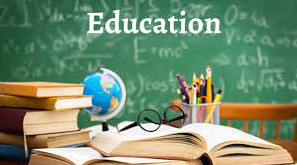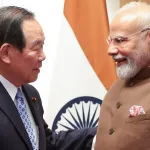PART-I
Education is often perceived as the structured dissemination of knowledge from one generation to another, a mere transfer of information. Yet, deeper introspection reveals that education transcends this simplistic view. It’s not just about filling the mind with facts; it’s about awakening a dormant divine potential that is unique to each individual, just like their fingerprints. This article explores the profound interplay between education and divine factors, proposing that education is a sacred journey led by teachers who draw out hidden potentials within their students.
NEP 2020 states that “The purpose of the education system is to develop good human beings capable of rational thought and action, possessing compassion and empathy, courage and resilience, scientific temper, and creative imagination, with sound ethical moorings and values. It aims at producing engaged, productive, and contributing citizens for building an equitable, inclusive, and plural society as envisaged by our Constitution”.
This vision of education aligns profoundly with the philosophical notion that education transcends the mere transfer of knowledge. It becomes a means to connect human development with divine factors—encouraging individuals to embody values like compassion, empathy, and ethical grounding, which are reflective of a higher purpose. By inculcating rationality, creativity, and inclusivity, education bridges the material and the spiritual, guiding humanity toward a harmonious existence envisioned both by our Constitution and the divine principles underpinning it.
The Unique Divine Blueprint of Every Individual
Nature provides striking metaphors for individuality: no two snowflakes are identical, and no two humans share the same fingerprints. This uniqueness is not limited to physical attributes but extends to intellectual and spiritual realms. Every individual carries within them a “divine factor”—a latent reservoir of knowledge, creativity, and wisdom waiting to be discovered and nurtured.
Rabindranath Tagore, a philosopher and poet, beautifully encapsulates this idea: “The highest education is that which does not merely give us information but makes our life in harmony with all existence.” Education must harmonize with the divine uniqueness of each individual, recognizing that knowledge is not imposed but awakened.
Philosophical Foundations: Education as Drawing Out
The etymology of the word “education” from the Latin educare means “to draw out.” This resonates with the belief that knowledge is inherent and not external. Plato, in his Allegory of the Cave, described education as the process of leading individuals from the darkness of ignorance to the light of understanding. For Plato, the teacher acts as a guide, not a giver of knowledge.
Similarly, John Dewey, the father of progressive education, emphasized: “Education is not preparation for life; education is life itself.” This aligns with the view that education is an organic process of unveiling the divine spark within each student.
The Divine Role of the Teacher
Every student is a unique research project for a teacher, a bearer of distinct divine blueprints waiting to be unveiled. The teacher’s role is to measure, analyze, and craft personalized pathways that draw out these hidden potentials, enabling students to achieve their best capabilities. When students reach to their bestpotential, at that potential they do not only transform their own lives but contribute meaningfully to the body of knowledge. The Holistic Progress Card (HPC) introduced under PARAKH by NCERT beautifully aligns with this philosophy, offering a comprehensive framework or mini thesis to nurture and assess every learner’s journey in a way that respects their individuality and divine essence.
In Islamic theology, role of the teacher is beautifully exemplified by the journey of the Prophet Muhammad (PBUH), whose knowledge signatures or divine factors were amplified through a divinely ordained interaction with the angel Jibreel (AS). As a conduit for divine will, Jibreel (AS) harmonized the pre-existing divine potential within the Prophet (SAW) with the preternatural inspiration necessary to channel it into transformative contributions to humanity and the body of knowledge. This sacred act highlights the profound role of a teacher—not merely as a conveyor of information but as a nurturer of latent potential, guiding individuals toward their highest purpose and collective benefit.
Teachers are not mere facilitators but divine agents entrusted with the sacred duty of awakening the hidden potentials within their students. Maria Montessori, a pioneer of child-cantered education, believed that every child is born with immense potential: “Free the child’s potential, and you will transform him into the world.”
This responsibility requires teachers to adopt pedagogies that respect the individuality of each learner, allowing their unique “divine fingerprint” of knowledge to emerge. As Albert Einstein once remarked, “It is the supreme art of the teacher to awaken joy in creative expression and knowledge.”
(Concluded…)
(The Author is Sr. Academic officer (Physics), Department of Education in Science & Mathematics, State Council of Educational Research Training (SCERT), Bemina, Srinagar. Email: [email protected])








